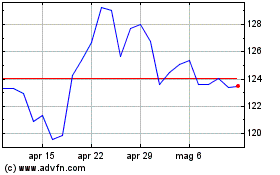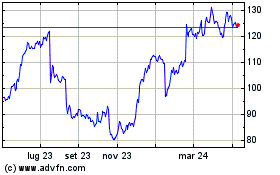US Credit-Card Delinquencies End 2010 At Lowest Point Of Year
18 Gennaio 2011 - 10:09PM
Dow Jones News
With delinquency rates for most U.S. issuers of credit cards
dropping to their lowest point in 2010, the challenge for these
companies is to increase lending amid stricter rules on card
fees.
Monthly data for December released Tuesday by issuers including
Capital One Financial Corp. (COF), American Express Co. (AXP),
Discover Financial Services (DFS), Bank of America Corp. (BAC) and
J.P. Morgan Chase & Co. (JPM), indicate that the worst of the
credit problems is behind them, although losses from souring loans
remain steep.
Now, the lenders need to increase the size of their loan
books.
The more that cardholders charge on their plastic, the more the
companies earn by way of fees, so the amount customers spend is
critical. Card-loan balances--and, as a result, revenue--have been
falling as companies, stung by steep losses during the economic
slump, scaled back on credit and toughened lending standards.
Credit-card issuing banks are also facing an erosion in profits
and revenue stemming from new expansive rules curbing income on
credit and debit cards.
At Capital One, a card-lender-turned-bank, U.S. card loans at
least a month behind payments fell to 4.09% in December from 4.26%
in November. Charge-offs in its U.S. credit-card business dropped
to an annualized 7.01% last month from 7.56% in November, according
to a regulatory filing Tuesday with the U.S. Securities and
Exchange Commission. Its shares were down 0.8% to $48.02 in
afternoon trading.
Charge-offs are loans that a card issuer deems uncollectible
because borrowers can't repay them; they are based on past
delinquent balances. Delinquencies are loans that may be written
off in the future. The delinquency rate is important because higher
delinquencies force issuers to squirrel away capital to cover
potential losses.
At American Express, which has an affluent cardholder base, the
30-day delinquency rate continued to fall. In an SEC filing
Tuesday, the company said delinquency rates fell to 2.1% in the
fourth quarter, according to preliminary data, from 2.5% in the
third quarter. AmEx wrote off an annualized 4.4% of its U.S. card
loans for the quarter ended Dec. 31, also according to preliminary
data, down from 5.2% in the third quarter. It shares recently
traded at $46.35, up 0.2%.
Discover said charge-offs in December totaled 5.94% of
credit-card loans that have been packaged into bonds, down from
6.72% in November. The 30-day delinquency rate fell to 3.91% last
month from 4.15% in November. Its shares rose 1.5% to $20.68.
Discover and its bigger rival, American Express, also process card
transactions in addition to issuing credit cards.
J.P. Morgan Chase, which reported fourth-quarter results Friday,
said charge-offs for the quarter fell to 7.08% from 8.06% in the
third quarter. In the same period, the 30-day delinquency rate fell
to 3.66% from 4.13%. The shares were little changed at $44.92.
Bank of America, at a write-off rate of 9.31% in December, had
the highest among its peers. But the rate was lower than the 9.92%
in November. Bank of America has consistently reported a higher
write-off rate than other major U.S. card issuers. Total
delinquencies were lower at 5.24% last month compared with 5.47% in
November. Bank of America shares recently traded at $15.01, down
1.6%.
Citigroup Inc. (C) said Tuesday it wrote off 7.84% of its
managed card loans in the fourth quarter, down from 8.69% in the
prior quarter; its stock was down 5.3% at $4.86 as its
fourth-quarter results, reported earlier Tuesday, missed Wall
Street expectations.
-By Aparajita Saha-Bubna, Dow Jones Newswires; 617-654-6729;
aparajita.saha-bubna@dowjones.com
Grafico Azioni Discover Financial Servi... (NYSE:DFS)
Storico
Da Lug 2024 a Ago 2024

Grafico Azioni Discover Financial Servi... (NYSE:DFS)
Storico
Da Ago 2023 a Ago 2024
